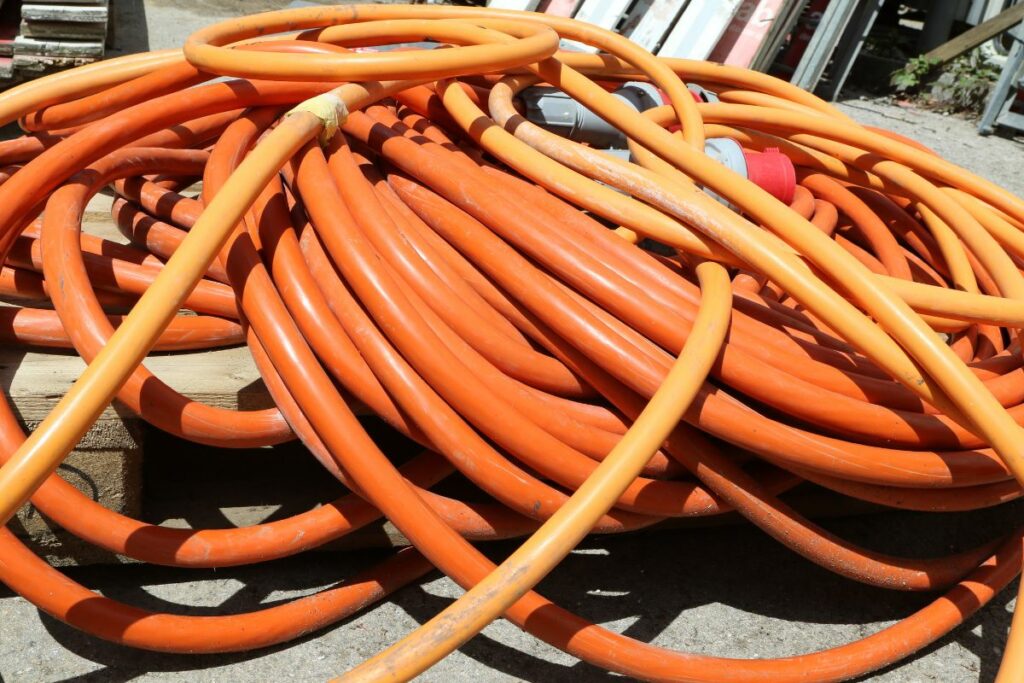*This post may contain affiliate links. As an Amazon Associate we earn from qualifying purchases.
Air compressors are a type of power tool that is commonly used in various industries, such as automotive repair and construction. An air compressor is used to provide pressurized air for a variety of purposes, such as inflating tires, powering pneumatic tools, and aiding in the operation of other machines.
Although an air compressor tank can be used at facilities and never moved it will sometimes be thrown on the back of a truck by contractors and used on a job site as well. Depending on how you plan on using your air compressor will depend on the specifications that you will want with an air compressor.
Large vertical air compressors are a good choice for indoor use or to be mounted to the back of a truck and used for a construction site. However, you will have to power those compressors (no matter where you use them at).
The question of whether air compressors are electric or not depends largely on what type of compressor you have. In this article, we’ll take a look at the different types of air compressors and answer the question “Are air compressors electric?”

Types of Air Compressors
There are two main types of air compressors: piston and rotary screw. A piston air compressor uses pistons to create compressed air from atmospheric pressure while a rotary screw air compressor uses rotating screws to do the same thing.
Each type has its own advantages and disadvantages, so it’s important to choose the right air compressor for your needs.
Piston Air Compressors
Piston air compressors use pistons to create compressed air by drawing in outside air and then compressing it inside the cylinder chamber. This type of air compressor typically runs on electricity the majority of the time.
Although not all piston air compressors are electrically powered the majority of them are. That means they can be plugged into a standard outlet. However, there are a few piston air compressor models that run on gasoline or diesel fuel instead.
Rotary Screw Air Compressors
Rotary screw compressors use rotating screws to generate compressed air from atmospheric pressure. This type of air compressor is also powered by either an electric motor or a diesel engine.
Electric motors are more common because they require less maintenance and produce less noise than diesel engines. Electric rotary screw compressors come in both single-stage and two-stage models, depending on how much pressure is needed for the application.
Is There An Electric Air Compressor?
When talking about buying air compressors it is important to know whether you can only get them powered by electricity or whether some of them are powered by another fuel source.
Piston air compressors are usually electric while rotary screw compressors can be either electric and gas (or diesel) powered. So although many air compressors are electric powered there are also some heavy-duty air compressors that use gasoline or diesel fuel to start and run as well.
So you can find and purchase an air compressor that use electricity (what many top brands offer) as well as more powerful stationary air compressors (with more horsepower and durability) that are diesel-powered.
If homeowners have some small projects around the garage, they won’t need a lot of HP so getting an electric air compressor that holds 10-15 gallons will be plenty of airflow. However, if you intend to use your air compressor for construction, whole-house painting, etc. you will want to get a larger 30 or 80-gallon air compressor.
And if you are doing construction projects off-grid (or a long way away from plugs) then getting a diesel air ompressor will provide you the versatility that you need.
Electric Compressors Vs Diesel (Power Source Differences)
Electric and diesel air compressors are two of the most common types of power supply used for compressing air. Each type has its own advantages and drawbacks, making them ideal for different applications.
The first difference between electric and diesel air compressors is their power source. Electric air compressors use an electric motor to generate compressed air while diesel engines use a combustion engine to generate compressed air.
Essentially electric compressors can easily work anywhere there is electricity. This is often more convenient than having to haul around fuel and risk spilling it. Instead, just plug it in, let the air compressor run, and the compressors air is ready to be used.
Electric air compressors also have the advantage of being quieter (of course depending on the compressor model), more environmentally friendly, and more efficient than their diesel counterparts.
Electric air compressors are also typically cheaper to purchase and easier to maintain. However, they require a reliable power source in order to operate, making them unsuitable for remote locations where access to electricity may be limited or unavailable.
Gas air compressors (or diesel) offer higher power output than electric models but are generally noisier and less efficient. They also tend to be more expensive upfront as well as having higher running costs due to fuel expenses.
On the other hand, diesel engines can be used in remote areas where electricity is not available, making these systems suitable for many off-grid applications. Additionally, this type of system often requires less maintenance than electric air compressor models due to their simpler design.
When choosing between an electric and diesel-powered air pump, it is important to consider your needs and budget carefully before making a decision. Electric compressors are usually more affordable upfront and more efficient while diesel-powered models offer greater power output but at a higher cost.
Consider the usage requirements of your project before deciding which type of compressor will best suit your needs.
Pros and Cons of Electric Air Compressors
Pros:
- More efficient than gas-powered air compressors
- Quieter operation compared to gas-powered air compressors
- Easier to maintain and use
- Less expensive to operate in the long run
- Lower initial cost compared to gas-powered air compressors
Cons:
- Limited mobility due to being connected to an electrical outlet
- Slower recovery time between uses
- Regular maintenance is required to ensure that electric air compressors continue to operate safely and efficiently over time.
Pros And Cons Of Diesel Air Compressors
Pros:
- Higher efficiency and longer run time than a gas compressor
- Reduced emissions compared to gasoline-powered engines
- Lower fuel costs than gasoline engines
- More power for larger jobs
- Can operate in extreme temperatures
- Increased portability (if you need a portable air compressor a diesel-powered one is best)
Cons:
- Noisier than electric compressors
- More expensive upfront cost than electric compressors
- Requires more maintenance than electric compressors
- Longer warm-up times than electric compressors
- Difficult to find replacement parts
Is A Gas Or Electric Air Compressor Better?
Let’s start with electric air compressors. They’re quiet, they’re clean, and they’re easy to use. I mean, what’s not to love? I once knew a guy who used an electric air compressor to put air into all his kids’ pool toys. It was a thing of beauty. He plugged it in, turned it on, and voila! Air-filled pool toys for the whole family.
An electric air compressor can easily convert power to compressed air that can be used to air up your tire, inflate your pool toys, or even run air tools as well. All without needing to do anything besides plugging the air pump in.
But then again, there’s something to be said for the power and reliability of a gas air compressor. You can take it anywhere, and it’ll never let you down.
It’s like the Energizer Bunny of air compressors.
Of course, gas air compressors have their downsides too. They’re loud, they’re smelly, and they require a little more maintenance. But hey, nothing worth having comes easy, am I right?
Gas air compressors may not be the easiest to handle, but they make up for it in raw power and portability.
So, which one is better? It really depends on what you need it for. If you’re working in a small garage or workshop, an electric air compressor will probably do the job just fine.
But if you’re out in the field, working on construction sites or in remote locations, a gas air compressor is going to be your best friend.
Both have their charms, but it really depends on what you’re looking for.
At the end of the day, the choice between gas and electric air compressors is a personal one. It’s like choosing between chocolate and vanilla ice cream. Both are delicious, but you just have to decide which one is your favorite.
Final Thoughts
So, are air compressors electric? Generally speaking, most piston air compressors are electrically powered while rotary screw models can be either electric or diesel-powered depending on their design and purpose.
It’s important to read the manual carefully before using any kind of air compressor so that you know what kind of power source is required for it to work properly as well as learn all the necessary maintenance and upkeep needed for your compressor.
